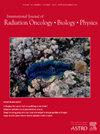晚期胆囊癌 (GBC) 一线化疗 (CT) 后巩固化放疗 (CTRT) 与观察的随机研究:RACE-GB 研究。
IF 6.4
1区 医学
Q1 ONCOLOGY
International Journal of Radiation Oncology Biology Physics
Pub Date : 2024-12-14
DOI:10.1016/j.ijrobp.2024.11.099
引用次数: 0
摘要
目的:CT是不能切除的晚期GBC患者的标准治疗方法,但他们的预后仍然很差。初扫后实变CTRT值不确定。因此,我们进行了一项单中心开放标签随机试验,评估在CT期间疾病没有进展的患者(部分缓解/疾病稳定)进行4个CT周期后的巩固性CTRT与观察性对照。材料与方法:对4个CT周期有反应者随机(1:1)分为CTRT组和观察组(n=135)。CTRT通过3d适形放射治疗(需要时Field - in - Field)与卡培他滨同时进行。RT的剂量为45 Gy,分25次对GBC和淋巴细胞,然后分5次对GBC增加9 Gy。主要终点是总生存期,从随机化日期开始计算。结果:67例患者随机分为观察组,68例患者随机分为CTRT组。巩固CTRT使中位总生存期从4个月提高到10个月(HR 0.43;95% CI, 0.32 ~ 0.62;P < 0.001)。实际中位生存期为7个月(95%CI 6.114至7.88),而13个月(95%CI 11.13至14.84)。CTRT引起的不良事件(3级或以上)为恶心:3%,贫血:9%,胃肠道出血:5.8%,肝毒性:13%。与观察值相比,CTRT未导致FACT G评分和FACT Hep评分恶化(p值分别为0.053和0.097)。结论:据我们所知,这是首次在LMIC环境下的随机研究,证明巩固性CTRT显着延长了总生存期而没有恶化生活质量,应该成为晚期不可切除GBC的替代治疗标准。本文章由计算机程序翻译,如有差异,请以英文原文为准。
A Randomized Study of Consolidation Chemoradiotherapy Versus Observation After First-line Chemotherapy in Advanced Gallbladder Cancers: RACE-GB study
Purpose
Chemotherapy (CT) is the standard of care for patients presenting with unresectable advanced gallbladder carcinoma (GBC) but their prognosis remains poor. The value of consolidation CT and radiation therapy (RT) after initial CT is uncertain. We, therefore, conducted a single-center open-label randomized trial evaluating consolidation CTRT versus observation after 4 cycles of CT in patients whose disease did not progress during CT (partial responders/stable disease).
Methods and Materials
Responders to 4 cycles of CT were randomized (1:1) to CTRT versus observation (n = 135). CTRT was delivered using 3-dimensional-conformal RT (Field in the field when required) along with concurrent capecitabine. The dose of RT was 45 Gy in 25 fractions to GBC and lymphatics followed by a boost of 9 Gy in 5 fractions to the GBC. The primary endpoint was overall survival (OS) which was calculated from the date of randomization.
Results
A total of 67 patients were randomized to observation and 68 to CTRT. Consolidation CTRT led to an improvement in median OS from 4 to 10 months (hazard ratio, 0.43; 95% CI, 0.32-0.62; P < .001). The actual median OS from accrual was 7 months (95% CI, 6.114-7.88 months) versus 13 months (95% CI, 11.13 -14.84 months). Adverse events (grade 3 or higher) because of CTRT were nausea (3%), anemia (9%), gastrointestinal bleeding (5.8%), and hepatotoxicity (13%). Functional Assessment of Cancer Therapy–General score and the Functional Assessment of Cancer Therapy–Hepatobiliary score did not deteriorate because of CTRT compared with observation (P values, .053 and .097).
Conclusions
To our knowledge, this is the first-ever randomized study in a low-middle-income country setting to demonstrate that consolidation CTRT significantly prolonged OS without deterioration in quality of life and should be the alternative standard of care in advanced unresectable GBC.
求助全文
通过发布文献求助,成功后即可免费获取论文全文。
去求助
来源期刊
CiteScore
11.00
自引率
7.10%
发文量
2538
审稿时长
6.6 weeks
期刊介绍:
International Journal of Radiation Oncology • Biology • Physics (IJROBP), known in the field as the Red Journal, publishes original laboratory and clinical investigations related to radiation oncology, radiation biology, medical physics, and both education and health policy as it relates to the field.
This journal has a particular interest in original contributions of the following types: prospective clinical trials, outcomes research, and large database interrogation. In addition, it seeks reports of high-impact innovations in single or combined modality treatment, tumor sensitization, normal tissue protection (including both precision avoidance and pharmacologic means), brachytherapy, particle irradiation, and cancer imaging. Technical advances related to dosimetry and conformal radiation treatment planning are of interest, as are basic science studies investigating tumor physiology and the molecular biology underlying cancer and normal tissue radiation response.

 求助内容:
求助内容: 应助结果提醒方式:
应助结果提醒方式:


